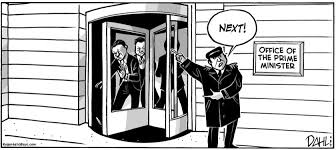Why wouldn’t we have Jacinda-envy?
May 9th, 2019 | Published in Power & Politics
“Oh, what I would give to be able to vote for an Australian Ardern in May,” writes Megan Graham, with that wistful hint of Jacinda-envy echoed by many who speak of the Prime Minister of New Zealand.
that wistful hint of Jacinda-envy echoed by many who speak of the Prime Minister of New Zealand.
Australia heads to the polls on 18 May 2019 at a time when trust in politicians is at its lowest ebb for 50 years.
Ardern, by contrast, has attracted global admiration, and been named on Time’s list of most influential people because of her compassionate, empathic, intelligent leadership.
In particular, Jacinda Ardern is held in high regard for her response to a white supremacist attack in New Zealand on 15 March 2019. An Australian gunman killed 50 Muslims and injured a further 50 gathered for prayer. The death toll later rose to 51 after a Turkish man, wounded in the mosque attacks, died in hospital.
Ardern led by example in condemning the attacks and reaching out to those directly affected. The rest of the world has “watched the response in New Zealand because of how rarely it appears countries come together in this way,” writes Krishnadev Calamur. “Jacinda Ardern met this moment with compassion, with empathy, with love, and also, crucially, she met it with strength.”
“Headlines around the globe screamed appreciation and admiration in a world starved, yes, longing for decent leaders,” adds Mari Marcel Thekaekara. “Can world leaders emulate her actions instead of spewing venom and stereotyping all Muslims as terrorists?” she asks.
Ardern united her country in grief and sorrow, rather than inflaming divisions, as prominent politicians in Australia seem programmed to do whenever Islam is a talking point.
We won’t have our own Jacinda Ardern by election day, regrettably. Waleed Aly, however, suggests she may, by her remarkable leadership, have short-circuited a “Tampa election…That’s local shorthand for a campaign characterised by race baiting and scare tactics about refugees.”
John Howard rode to shameful electoral ‘success’ in 2001 by refusing to allow the Tampa to enter Australian  waters. Arne Rhinnan, captain of the Norwegian ship, had rescued 438 people seeking asylum in Australia from the Palapa, a broken down fishing boat which had brought them from Indonesia.
waters. Arne Rhinnan, captain of the Norwegian ship, had rescued 438 people seeking asylum in Australia from the Palapa, a broken down fishing boat which had brought them from Indonesia.
The Palapa survivors were forcibly removed to Nauru by the Howard government. This prime ministerial inhumanity kickstarted the current offshore processing and boat turnbacks.
By contrast, Jacinda Ardern has repeated the offer of previous prime ministers in New Zealand to provide resettlement for refugees from Australia’s offshore detention centres. The offer has been standing since 2013, but successive Australian governments have rejected it.
Head-to-head through the revolving-door
Of course we have Jacinda-envy. Why wouldn’t we? When you look at the head-to-heads between revolving door prime ministers in Australia over recent years.
Australia’s current prime minister, Scott Morrison, and his two predecessors, Malcolm Turnbull and Tony Abbott, hold shared views on refugee policy (distinctly un-Christian ones for men claiming to be Christians, writes Julian Burnside).
Scott Morrison was minister for immigration under Tony Abbott, and displays a model of a boat in his office with a sign declaring “I Stopped These”.
For the past five and a half years, Abbott, Turnbull, Morrison, and Peter Dutton (minister for Home Affairs) have scuffled over the leadership like kids in a poorly supervised playground.
Tony Abbott was prime minister from September 2013 until September 2015. At that stage, Malcolm Turnbull grabbed the baton and ran (every which-way) with it until he, in turn, was toppled by Scott Morrison in August 2018.
These three – Abbott, Turnbull, and Morrison – are part of a line of 30 (all white) prime ministers since the office was created in 1901. Twenty nine of the thirty have also been male. Julia Gillard was the exception from 2010 to 2013.
Peter Dutton continues to bide his time for his grab at the keys to The Lodge. If, that is, he survives the campaign against him and manages to retain his seat of Dickson in the May 2019 election.

A “demented cycle of vengeance”
Peter Hartcher writes about the obsessive competition between these supposedly mature men whose quest for personal power has seemingly taken precedence over their jobs (here, here, here, here, and here).
More time and energy has been spent on one-upmanship, and wrestling across the divisions within their own party, than paying attention to the world outside their particular barn fight.
Hartcher describes “a long and demented cycle of vengeance”, commenting (among others) as follows.
Morrison shafts Turnbull
Scott Morrison, master of plausible deniability, did not plot against Malcolm Turnbull, or any other colleague, he says. Anyone who claims otherwise must be mistaken, he says.
Morrison is, according to Sean Kelly, “a conviction politician, conveniently free from upsetting convictions”. Perhaps his background in marketing is showing! The capacity “to firmly believe two contradictory things at once is everywhere in his career”.
“This is my leader and I’m ambitious for him!” he declared of Turnbull on August 22, 2018. Two days later, Turnbull was gone. Morrison had taken his place.
Hartcher notes:
The initial vote on the leadership on August 21 was a two-man contest between Turnbull and Dutton. Morrison was not in the game. He got five of his supporters to vote for Dutton.
It was a ruse. Those five were not aiming to install Dutton. They were parked temporarily in a bid to get rid of Turnbull. Then, when Turnbull’s position became hopeless, Morrison entered the game. The five switched their support to Morrison. It worked.
Treacherous, ruthless, self-interested are a few of the terms that come to mind. Redeeming features seem thin on the ground, although Morrison is reputedly smart and capable. Some describe him as ‘personable’, although I fail to see this, and it doesn’t seem particularly relevant.
Do we really want politicians to share a beer with? asks Claire Bond Potter. Or, do we want ones we “can trust to do the work”?
I would personally go without, rather than share a beer with Morrison. I loathe his policies from a social justice perspective. I see him as both opportunistic and fumble-footed in his role, and wouldn’t trust him to run my blog, let alone the country, with any integrity.

Morrison helps Turnbull shaft Abbott
Morrison is, at least, smart and capable enough to have helped topple Abbott and install Turnbull in his place. This manoeuvre was part of a long game.
When Abbott was prime minister, Morrison was minister for immigration. He wanted to be treasurer. Abbott kept Joe Hockey in the role.
Turnbull, on the other hand, promised Morrison the job as treasurer, and gave it to him the moment they succeeded in destroying Abbott.
“Abbott had been deeply unpopular,” writes Hartcher. “The people thought that Turnbull had saved them from him. In truth, the Turnbull government was a policy cohabitation with Abbott.”
Morrison played his cards close to the chest. Turnbull, on the other hand, sold out publicly to the far right – on climate change, marriage equality, and the republic – all the issues that had been central to his progressive appeal.
He’s on record as telling colleagues he wanted to be prime minister by the time he was 40. When he turned 60 and hadn’t made it, he appears to have decided to do anything to get the job.
Within the party, Turnbull was tolerated because he was seen as more likely than Abbott to win an election. The conservative faction detested him, however, and the electorate felt increasingly let down by him.
His Faustian bargain with the far right rendered him weak and untrustworthy in a way no amount of charm could salvage.



Abbott shafts everyone
Once Abbott was deposed, he “set about destroying the leader of his party”.
Turnbull tried to get rid of him by offering the post of high commissioner to London. Abbott refused.
Abbott had a mission to destroy Turnbull. He inflamed the divisions within his own party to do so. He was a wrecking ball, exploiting the skills he had honed in opposition and as prime minister.
Instead of the sweeping victory with 57 per cent of the two-party vote the polls suggested Turnbull would have achieved when first elected leader in September 2015, he ended up, in July 2016, with 50.4 per cent of the vote.
The government lost 14 seats and was reduced to a single-seat margin.
In order to shaft Turnbull, Abbott was prepared to shaft his party’s chances of success, and the electorate at large. On the crucial policy of climate change, according to Greg Foyster, he “sacrificed Australia’s long term interests for his own short-term political gain.”
Abbott’s wrecking tactics cost him the respect and support of increasing numbers of his colleagues. His visions of a glorious return to the top job faded. This didn’t deter him. More important than recovering the prime ministership for himself was to wrench it away from Turnbull.
Abbott has since said he would be willing to return to the top job…The man’s capacity to read the room seems to be seriously compromised!
I know politics has a reputation as a dirty game. But, seriously? This broken-record alpha-male power-struggle is the stuff of locker-room bullying, the product of competition between privileged white males with an inflated sense of entitlement.
Dutton bides his time
Peter Dutton, minister for immigration under Abbott and Turnbull, was given the super-ministry of Home Affairs by Turnbull. He continued in this role under Morrison, casting his shadow over security, law enforcement, immigration and citizenship. Dutton’s super-powers spread to other ministers and their powers.
Despite all that power, Dutton continues to harbour ambitions to be prime minister.
‘‘Of course I want to be prime minister,’’ he acknowledges. “That’s an ambition long held and is only realistic if stars align and an opportunity comes up.”


His pivotal role in the appalling treatment of people in detention stirs dread in many voters at the prospect of a successful prime ministerial coup. GetUp! has a concerted campaign against him in his seat of Dickson, and it will be one that’s closely watched on election day.
Dutton’s wife, Kirilly, tells us [via Murdoch media; link no longer available] he’s not a monster. He’s a really good father, and anybody who knows him well gets quite riled up about the things people say about him, because they say, ‘that’s not him’.
Some people are experts at compartmentalisation. Perhaps Dutton is one of them. Others don’t seem to get the fact that people’s characters and personalities can shift and change to suit the role of the moment. Dutton in his role as minister and Dutton as family man, friend, or colleague are potentially very different personas.
Why wouldn’t we have Jacinda-envy?
With these four men – Abbott, Turnbull, Morrison, and Dutton – as foils, why wouldn’t we have Jacinda-envy?
Many people I know are seriously considering their options. Moving to New Zealand is a popular one if the Morrison-led Coalition wins the election on 18 May. Are you one of these who have had enough? Or, will you stay put – for reasons such as employment, family, and other commitments, and also to continue the fight?
Share your thoughts in the Comments…Joan Beckwith


Scroll down for COMMENTS First-time comments have to be moderated. I try to complete that process, and respond, within 24 hours
Do check back
Social justice is for everyone (previously 2020socialjustice) is also on Facebook (click here)
Joan Beckwith on Twitter (click here)
…………………………………………….
NOTE: If you like this post, you might find others of interest in the category on Power & Politics. Additionally, the Favorites category brings together posts from across all main categories and provides a sense of the scope of this website and blog.



Thanks for sharing this great post
” Why wouldn’t we have Jacinda-envy? “